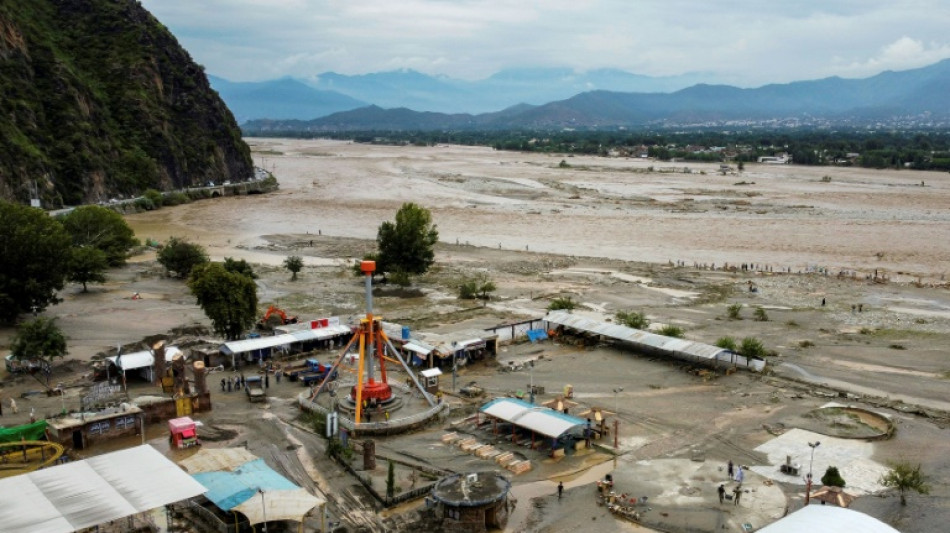
-
 Late Guirassy winner for Dortmund trims Bayern's lead atop Bundesliga
Late Guirassy winner for Dortmund trims Bayern's lead atop Bundesliga
-
'Free the mountains!": protest in Milan over Winter Olympics

-
 Gyokeres double helps Arsenal stretch Premier League lead
Gyokeres double helps Arsenal stretch Premier League lead
-
Six Nations misery for Townsend as Italy beat sorry Scotland

-
 Spain, Portugal face fresh storms, torrential rain
Spain, Portugal face fresh storms, torrential rain
-
Opinions of Zuckerberg hang over social media addiction trial jury selection

-
 Over 2,200 IS detainees transferred to Iraq from Syria: Iraqi official
Over 2,200 IS detainees transferred to Iraq from Syria: Iraqi official
-
Norway's Ruud tops Olympic men's freeski slopestyle qualifying

-
 Czech qualifier Bejlek claims first title in Abu Dhabi
Czech qualifier Bejlek claims first title in Abu Dhabi
-
French duo reach Shanghai, completing year-and-a-half walk

-
 Australian snowboarder James eyes elusive Olympic gold
Australian snowboarder James eyes elusive Olympic gold
-
Sequins and snow: Eva Adamczykova makes Olympic return

-
 Vonn set for Olympic medal bid after successful downhill training
Vonn set for Olympic medal bid after successful downhill training
-
Shepherd takes hat-trick as West Indies beat Scotland in T20 World Cup

-
 Sausages will sell after thrill-seeker Von Allmen wins Olympic downhill
Sausages will sell after thrill-seeker Von Allmen wins Olympic downhill
-
Swiss racer Von Allmen wins first gold of Winter Olympics

-
 'Wake up': Mum sparks comeback after scare for freeski star Gu
'Wake up': Mum sparks comeback after scare for freeski star Gu
-
Von Allmen wins men's Olympic downhill gold, first of Games

-
 First medals up for grabs at Winter Olympics
First medals up for grabs at Winter Olympics
-
Afghanistan captain Khan harbours dream of playing in Kabul

-
 Lindsey Vonn completes second Winter Olympics downhill training run
Lindsey Vonn completes second Winter Olympics downhill training run
-
Freeski star Gu survives major scare in Olympic slopestyle

-
 Iran FM looks to more nuclear talks, but warns US
Iran FM looks to more nuclear talks, but warns US
-
Hetmyer's six-hitting steers West Indies to 182-5 against Scotland

-
 After boos for Vance, IOC says it hopes for 'fair play'
After boos for Vance, IOC says it hopes for 'fair play'
-
Thousands gather as Pakistan buries victims of mosque suicide attack

-
 Lindsey Vonn completes second downhill training session
Lindsey Vonn completes second downhill training session
-
US pressing Ukraine and Russia to end war by June, Zelensky says

-
 Faheem blitz sees Pakistan avoid Netherlands shock at T20 World Cup
Faheem blitz sees Pakistan avoid Netherlands shock at T20 World Cup
-
Takaichi talks tough on immigration on eve of vote

-
 England's Salt passed fit for T20 World Cup opener
England's Salt passed fit for T20 World Cup opener
-
Spain, Portugal brace for fresh storm after flood deaths

-
 Pakistan bowl out Netherlands for 147 in T20 World Cup opener
Pakistan bowl out Netherlands for 147 in T20 World Cup opener
-
Pushed to margins, women vanish from Bangladesh's political arena

-
 Crypto firm accidentally sends $40 bn in bitcoin to users
Crypto firm accidentally sends $40 bn in bitcoin to users
-
Pistons end Knicks' NBA winning streak, Celtics edge Heat

-
 Funerals for victims of suicide blast at Islamabad mosque that killed at least 31
Funerals for victims of suicide blast at Islamabad mosque that killed at least 31
-
A tale of two villages: Cambodians lament Thailand's border gains

-
 Police identify suspect in disappearance of Australian boy
Police identify suspect in disappearance of Australian boy
-
Cuba adopts urgent measures to address energy crisis: minister

-
 Not-so-American football: the Super Bowl's overseas stars
Not-so-American football: the Super Bowl's overseas stars
-
Trump says US talks with Iran 'very good,' more negotiations expected

-
 Trump administration re-approves twice-banned pesticide
Trump administration re-approves twice-banned pesticide
-
Hisatsune leads Matsuyama at Phoenix Open as Scheffler makes cut

-
 Beyond the QBs: 5 Super Bowl players to watch
Beyond the QBs: 5 Super Bowl players to watch
-
Grass v artificial turf: Super Bowl players speak out

-
 Police warn Sydney protesters ahead of Israeli president's visit
Police warn Sydney protesters ahead of Israeli president's visit
-
Simi Khanna Launches Simi Beauty SK: A Natural Skincare Line Blending Luxury, Wellness, and Purpose

-
 Best Gold IRA Companies February 2026 Announced (Top Gold-backed IRA Companies Revealed)
Best Gold IRA Companies February 2026 Announced (Top Gold-backed IRA Companies Revealed)
-
Bolivia wants closer US ties, without alienating China: minister


Pakistan orders thousands to evacuate near flood-swollen rivers
Thousands of people living near flood-swollen rivers in Pakistan's north were ordered to evacuate Saturday as the death toll from devastating monsoon rains neared 1,000 with no end in sight.
Many rivers in Khyber Pakhtunkhwa -- a picturesque province of rugged mountains and valleys -- have burst their banks, demolishing scores of buildings including a 150-room hotel that crumbled into a raging torrent.
"The house which we built with years of hard work started sinking in front of our eyes," said Junaid Khan, 23, the owner of two fish farms in Chrasadda.
"We sat on the side of the road and watched our dream house sinking."
The annual monsoon is essential for irrigating crops and replenishing lakes and dams across the Indian subcontinent, but each year it also brings a wave of destruction.
Officials say this year's monsoon flooding has affected more than 33 million people -- one in seven Pakistanis -- destroying or badly damaging nearly a million homes.
On Saturday, authorities ordered thousands of residents in threatened areas to evacuate their homes as rivers had still not reached maximum capacity.
"Initially some people refused to leave, but when the water level increased they agreed," Bilal Faizi, spokesman for the Rescue 1122 emergency service, told AFP.
Officials say this year's floods are comparable to 2010 -- the worst on record -- when over 2,000 people died and nearly a fifth of the country was under water.
Farmer Shah Faisal, camped by the side of a road in Chrasadda with his wife and two daughters, described how he saw his riverside home swallowed by a river as the powerful current eroded the bank.
The Jindi, Swat and Kabul rivers flow through the town before joining the mighty Indus, which is also flooding downstream.
"We escaped with our lives," Faisal told AFP.
- Climate change -
Officials blame the devastation on man-made climate change, saying Pakistan is unfairly bearing the consequences of irresponsible environmental practices elsewhere in the world.
Pakistan is eighth on the Global Climate Risk Index, a list compiled by the environmental NGO Germanwatch of countries deemed most vulnerable to extreme weather caused by climate change.
Still, local authorities must shoulder some of the blame for the devastation.
Corruption, poor planning and the flouting of local regulations mean thousands of buildings have been erected in areas prone to seasonal flooding -- albeit not as bad as this year.
The government has declared an emergency and mobilised the military to deal with what Climate Change Minister Sherry Rehman on Wednesday called "a catastrophe of epic scale".
According to the National Disaster Management Authority, since the monsoon started in June more than two million acres of cultivated crops have been wiped out, 3,100 kilometres (1,900 miles) of roads have been destroyed and 149 bridges have been washed away.
In Sukkur, more than 1,000 kilometres south of Swat, farmlands irrigated by the Indus were under water, and tens of thousands of people were seeking shelter on elevated roads and highways as they waited for fresh torrents from the north.
"We have opened the gates fully," dam supervisor Aziz Soomro told AFP, adding the main rush of water was expected Sunday.
The flooding could not come at a worse time for Pakistan, whose economy is in free fall and whose politics are gripped by crisis following the ousting of former prime minister Imran Khan by a parliamentary vote of no confidence in April.
P.Stevenson--AMWN


